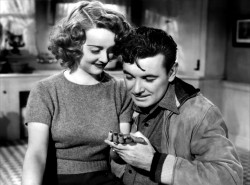Cinema | August 19th, 2015

The year 1939 is often remembered for its unusually high percentage of enduringly popular classic films (about 20 of which are currently available on Blu-ray in nice restorations), as well as many other things, from the September outbreak of the second World War in Europe, to the New York World’s Fair showcasing hopes for a peaceful and prosperous technology-based future, to the introduction of regular if limited broadcast television for the American public.
Released to Blu-ray this June, both individually and in Warner Home Video’s “Golden Year” five-film, six-disc box set, “Dark Victory” is another one of those 1939 “golden year” films that was a big hit when it came out, later came to be considered a classic and today holds up to varying degrees for various reasons. Along with “Dodge City,” it’s one of two films in the set actually produced by the Warner Brothers studio at the time, though the rights to all are now controlled by Warner. Also in the collection are “The Hunchback of Notre Dame,” made at the RKO studio, “Ninotchka,” a Metro-Goldwyn-Mayer production, and “Gone With the Wind,” produced by the Selznick studio and originally released by MGM. The sixth disc is just a DVD rather than a Blu-ray, which includes the informative documentary “1939: Hollywood’s Greatest Year” as well as various 1939 shorts, cartoons and trailers, some of which are also included (in standard-definition) on the individual movie discs.
“Dark Victory” is basically a soap-opera about a spoiled rich girl, and a standard predictable “fatal disease romance” (a subgenre revived in recent years), but Warner Brothers’ slick execution with a solid cast under director Edmund Goulding is done so well that it’s not difficult to get sucked into the story once it gets going. Obviously Academy voters were impressed enough in a year of impressive films that “Dark Victory” earned Oscar nominations for Best Picture, Best Actress and Best Score. It certainly contains one of Bette Davis’s most memorable performances (reportedly her own personal favorite), which is one of the primary reasons for watching the film.
As the film begins, Davis’ free-spirited character Judith Traherne is living it up throwing parties and riding horses, but she gets increasingly frequent headaches and dizzy spells until a fall from a horse prompts her secretary/best friend (Geraldine Fitzgerald) to send for the family doctor (Henry Travers). He insists she see a specialist (George Brent) who postpones his retirement plans to take the case and perform brain surgery. In the process of dealing with his initially reluctant, then profoundly grateful patient, he falls in love with her and decides not to tell her that the tumor removal would not delay her death any longer than several months.
Of course she’s fallen in love with him by this time and when she inevitably learns her negative prognosis feels bitterly betrayed. She decides to drink away her remaining days with a pleasant alcoholic friend (Ronald Reagan) and almost gives herself to her virile Irish stableboy (Humphrey Bogart, of all people) who has loved her from a respectable distance. Ultimately she accepts her impending fate, makes up with her friend and the doctor, marries him and moves to Vermont with him to keep house while he does research, living as though life is normal.
There are no surprises in the plot developments, and we know the end is coming from the beginning, but Davis demonstrates her screen magnetism as she runs the gamut of emotions and attitudes. Fitzgerald is quite effective and the rest of the cast is fine, but it’s Davis who pretty much single-handedly turns the turgid melodrama into a moving psychological character study. The crisp black-and-white cinematography and Warner Brothers’ typically high production values help intensify her performance. Seeing a lower-quality copy on DVD, VHS or streaming, with their inherent lack of texture and fine detail, would definitely detract from the story’s overall effectiveness even though they may preserve the dialogue with a suggestion of the basic performances and settings.
Warner’s Blu-ray has a very good HD transfer with rich contrast range and a natural film-like level of grain, and it is so sharp that you can easily see when the closeups of the 31-year-old Bette Davis are intentionally soft-focus. Audio likewise is quite strong for a 1939 film. There’s a nice selection of bonus features, including an okay 10-year-old audio commentary, a radio play adaptation starring Davis, a 10-year-old featurette about the film’s history, and a 1939 “Warner Night at the Movies” consisting of a trailer, newsreel (with a UCLA watermark), patriotic short and cartoon. All sadly are standard-definition. For whatever reason the cartoon included is “Robin Hood Makes Good,” which is also a bonus on the new Blu-ray of “Robin and the 7 Hoods” (although still standard-definition on that disc as well).
“DARK VICTORY” on Blu-ray – Movie: B+ / Video: A / Audio: A / Extras: B-
February 9th 2026
February 4th 2026
January 26th 2026
January 19th 2026
January 12th 2026
__293px-wide.jpg)
_(1)__293px-wide.jpg)

_(1)_(1)_(1)_(1)_(1)__293px-wide.jpg)

_(1)_(1)_(1)_(1)_(1)__293px-wide.jpg)